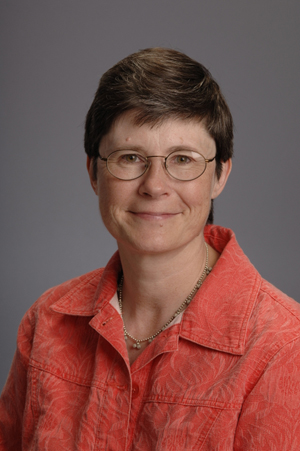Naming a New Associate Provost for Faculty Development
Julie Sandell’s mission: promote diversity and opportunity

Fulfilling a recommendation from the Boston University Council on Faculty Diversity and Inclusion (CFDI), University Provost David Campbell has announced that Julie Sandell, a School of Medicine professor and researcher in the department of anatomy and neurobiology, will serve as associate provost for faculty development, a new position designed to encourage professional development, support, and diversity on campus.
“I am delighted that Professor Sandell has accepted the appointment,” Campbell says. “Julie demonstrated her long-standing commitment to the key issues of faculty diversity, equity, and mentoring while a member of the Council on Faculty Diversity and Inclusion and will bring this commitment to her new position.”
Sandell, who has served as chair of the Boston University Faculty Council, will work closely with Campbell and President Robert A. Brown.
“The chance to work across the entire University on behalf of faculty is very exciting to me,” Sandell says. “We have an administration making that a priority, which is wonderful.”
Part of Sandell’s mission will be to increase the number of women and underrepresented racial and ethnic groups on the faculty. But rather than place the responsibility for diversity on the shoulders of one person, Sandell says, the idea is to help create an environment in which diversity is a priority in hiring and professional development a key in retention for all departments.
A 29-page report released this spring, “Excellence Through Diversity,” showed that only 10 percent of the 1,515 full-time Charles River Campus faculty are nonwhite, with only 1.3 percent African-American and 1.5 percent Hispanic. Nearly 8 percent of Charles River Campus faculty are Asian. On the Medical Campus, 80 percent of the 542 full-time faculty are white, 15.5 percent are Asian, 1.5 percent are African-American, and about 3 percent Hispanic. The two-year study also revealed that from 1997 to 2005, an average of 31 percent of tenure-track faculty hired on the Charles River Campus were female. In 2006, that number rose to 41 percent, and in 2008 it was 50 percent.
Brown launched a similar faculty development initiative in 2002 when he was provost at Massachusetts Institute of Technology. “Fostering the development of our faculty is critical to the advancement of the University,” he says. “Julie brings her experience as chair of the Faculty Council and her work as a member of the Council on Faculty Diversity and Inclusion. I look forward to working with her in this new role.”
Sandell joined the department of anatomy and neurobiology in 1991 and is vice chair. She also maintains a lab on the Medical Campus, where her research is funded by the U.S. Department of Veterans Affairs and by the National Institutes of Health.
“Certainly diversity is an area that all universities aspire to improve in,” says Gloria Waters, dean of Sargent College of Health & Rehabilitation Sciences and CFDI cochair. “The basic idea is to foster excellence and in doing so, attract a diverse faculty.”
Last spring, the provost’s office began conducting exit interviews for all departing faculty. Sandell plans to take that a step further.
“I’d like to do entrance interviews,” she says. “I’d like to meet with each new hire and establish a relationship right off. I want to understand what brought them to the University, what their backgrounds and professional goals are. By starting at the beginning, there may be the need for fewer exit interviews.”
Other duties as associate provost will include:
• Serving as an ex officio voting member of the University Appointment, Promotion, and Tenure Committee, as appointed by the University provost and the chair of the Faculty Council.
• Becoming a key advisor to the provost and the president on faculty and academic administrative appointments and faculty salary equity.
• Working with deans on mentoring and faculty development programs.
• Collaborating with Institutional Research to develop reports and maintain databases on faculty development and diversity.
• Designing and implementing leadership training and education for chairs of departments and search committees.
“It’s going to be a fascinating position,” Sandell says, “and I look forward to being a positive force for the faculty.”
Caleb Daniloff can be reached at cdanilof@bu.edu.
Comments & Discussion
Boston University moderates comments to facilitate an informed, substantive, civil conversation. Abusive, profane, self-promotional, misleading, incoherent or off-topic comments will be rejected. Moderators are staffed during regular business hours (EST) and can only accept comments written in English. Statistics or facts must include a citation or a link to the citation.